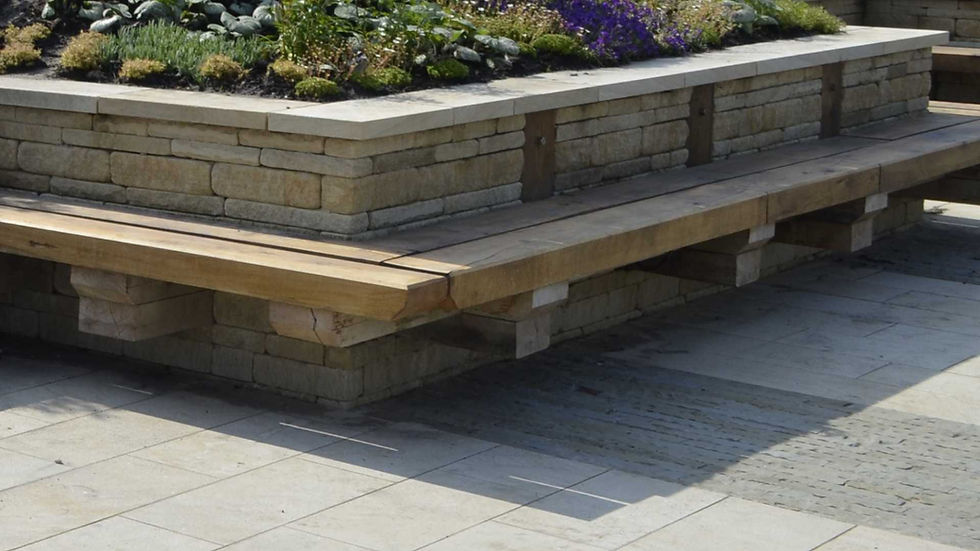Choosing Local Stone Suppliers: A Practical Guide for Landscape and Architectural Projects
- James Mcgregor
- Jul 30, 2025
- 3 min read
Natural stone continues to be a defining material in landscaping and architecture, valued for its durability, authenticity, and visual impact. Whether the project involves random walling, coursed walling, drystone construction, paving, or cladding, working with a trusted local stone supplier is essential to achieving lasting, high-quality results.
This guide outlines how to find a reliable supplier, what to look for when reviewing stone materials, and why local sourcing brings advantages beyond convenience — especially in terms of cost, sustainability, and project efficiency.
Why Local Stone Suppliers Matter
Sourcing stone locally offers distinct benefits:
Faster lead times and reduced transport costs
Lower carbon footprint
Better alignment with local planning and conservation requirements
Direct access to physical samples and expert guidance
Stones like Yorkstone, Portland stone, and Welsh slate are widely specified across the UK for their strength, weather resistance, and compatibility with British architecture. Working with a supplier nearby also ensures greater control over material selection and communication throughout the project.

What Makes a Stone Supplier Trustworthy?
Choosing a stone supplier is more than comparing prices or searching for “stone supplier near me.” A quality supplier should demonstrate:
A proven track record in supplying stone for landscaping, hardscaping, and architectural work
Access to a diverse product range, including backed-off random walling, coursed walling, and hand-selected drystone walling
Clear, visible sustainability policies
Willingness to provide samples, technical support, and site visit opportunities
Reliable delivery schedules and full material traceability
Seeing stock in person — whether slabs, cropped walling, or tumbled setts — allows for a better assessment of consistency, tone, and finish.
Common Stone Types and Their Uses
Understanding the properties of various stone types can inform smarter decisions when selecting suppliers or specifying products:
Sandstone – Ideal for patios, pathways, and decorative walls; warm-toned and durable
Limestone – Popular for internal flooring and facades; subtle and elegant
Granite – Robust and weather-resistant; suitable for heavy-duty or high-traffic areas
Slate – Favoured for cladding, roofing, and water features; dark, layered, and textured
Marble – Used primarily for interiors or feature details; refined and highly polished
Each material has specific quarrying and finishing requirements, so sourcing from a supplier who understands those differences is key.

Sustainability in Stone Supply
Environmental performance is now central to stone specification. Reputable local suppliers should demonstrate:
Responsible quarrying practices that restore landscapes and minimise disruption
Low-waste cutting and processing, including CNC and banker masonry
Use of offcuts or availability of reclaimed stone
Short transport routes to reduce embodied carbon
Commitment to long-term resource stewardship
Choosing a stone supplier near you who prioritises sustainability is not just better for the planet — it often supports local jobs and increases chances of planning success.
How to Find a Local Stone Supplier You Can Trust
With many options available, a careful approach to selection pays off. Consider these steps:
Use specific terms in your search:
“random walling stone supplier near me”
“coursed walling for public realm”
“Yorkstone paving UK”
Confirm the supplier can deliver at the scale and pace required
Ask for case studies or project references
Look for in-house production capabilities — such as cropping, tumbling, or bespoke dressing
Check their understanding of installation, not just material supply
A supplier who knows how stone performs on site will help reduce waste, avoid delays, and align with your build method.
Final Thoughts: Getting More from Your Stone Supplier
The right local supplier will go beyond delivering stone. They will support the project through:
Expert product advice based on use case
Faster, more efficient logistics
Better installation outcomes through consistent bed depths and processing
Lower environmental impact through local sourcing and material efficiency
When it comes to random walling, coursed walling, drystone construction, or feature stonework, investing in the right supplier relationship is a critical step in delivering work that lasts.

Natural Stone with Legacy and Longevity
Natural stone is more than just a building material — it represents a connection to the land and a long tradition of craftsmanship. Choosing a local stone supplier who understands this legacy ensures your work reflects that same care, quality, and intention — from the quarry to the finished wall.


